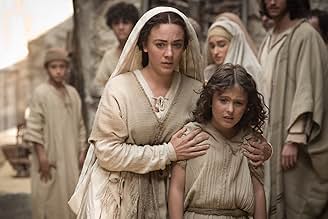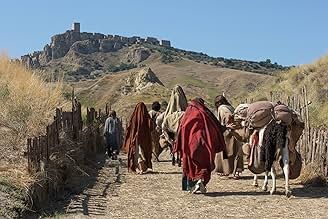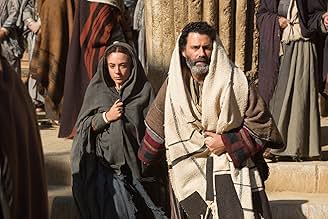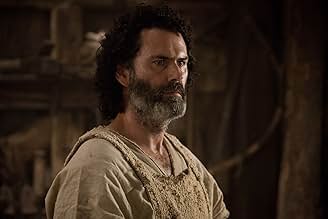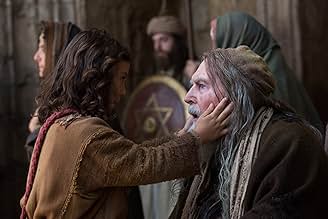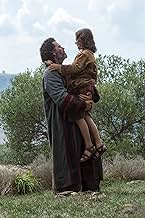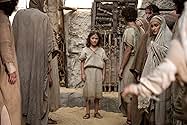La storia di Gesù Cristo all'età di sette anni mentre lui e la sua famiglia lasciano l'Egitto per tornare a casa a Nazareth.La storia di Gesù Cristo all'età di sette anni mentre lui e la sua famiglia lasciano l'Egitto per tornare a casa a Nazareth.La storia di Gesù Cristo all'età di sette anni mentre lui e la sua famiglia lasciano l'Egitto per tornare a casa a Nazareth.
- Premi
- 3 vittorie
- James
- (as Finn McLeod Ireland)
- Riba
- (as Dune Medros)
- Eleazer's Father
- (as Jarreth Merz)
Trama
Lo sapevi?
- QuizBased on apocryphal writings about Jesus' childhood from highly disputed accounts such as the Gospel of Peter.
- BlooperSurely his family and friends would have called him Yeshua or Joshua? Jesus is the Greek translation. Also he would have been addressed as Yeshua ben Joseph not bar Joseph.
- Citazioni
[last lines]
Jesus: I've learned so much since leaving Egypt. I know everything I can for today. I even know I'm going to die. I used to wonder if angels would come to me, if they would sing to me, if they would fill my dreams. There is still so much that I don't know, but I do know this. I don't think I'm here to see angels or to hear them sing. And I don't think I'm here to make it rainy or sunny or anything like that. I think I'm here just to be alive. To see it, hear it, feel it, all of it. Even when it hurts. Someday you will tell me why else I'm here. I don't know when, but you will. I know that. Because, Father, I am your child.
- Colonne sonoreBarcheinu Avinu
Written by Shlomo Carlebach (as Rabbi Shlomo Carlebach), BMI
Used with the permission of the Estate of Rabbi Shlomo Carlebach
The film starts with the young Jesus (Greaves-Neal) living in Alexandria with his parents Joseph (Walsh), Mary (Lazzaro) and their extended family. After drawn-out moments of pensive staring and one half-hearted occasion of necromancy, the family decides to trek back to Judiah since the infamous King Herod is dead. Then the family walks, and walks, and walks until finally they don't. They stop in Nazareth, then Jerusalem slowly realizing that their movements are being monitored by Severus (Bean), a Roman centurion tasked with finding a certain seven-year-old with a knack for miracles.
The main source of attempted tension comes from Severus and Herod Jr. (Bailey) trying to find the mythic child of Bethlehem. The film takes great pains in making Herod as traditionally evil as possible complete with effeminate, overly dramatic mannerisms, a testy anger and an almost stunning lack of awareness. Sean Bean fairs a little better as Severus by simply phoning it in as the bad guy with a complicated past. Yet even his jaded, near expressionless presence can't make the film exciting. The moments of "chase" are largely missed connections with supporting characters pointing north and saying "he went that a- way." Meanwhile Severus prattles on about Roman steel. We all know the story of Jesus, or at least we know enough to assume he's not captured by Romans at seven-years-old so why is this dull chase the centerpiece of this dribble? At no point in time will a reasonable viewer think Jesus is in any real harm so why the cloak and daggers BS?
The secondary source of tension comes from Joseph's unwillingness to speak to Jesus about his origins because of...reasons. What those reasons are, we're never made privy to. Half-realized conversations happen with such regularity that one would be hard-pressed to find anyone's reasons for doing anything in this movie. Jesus on the other hand seems to take things in stride, performing miracles, showing off in front of rabbis and otherwise being the embodiment of Christ in miniature form. That's great and all, but he's not exactly an interesting character. Instead he's every "the one," "the special," the superhero Metropolis needs," we've seen thousands of times before. I understand Jesus's tale is the granddaddy of all heroes journeys but this film approaches the source material with such a pitiful lack of imagination that Jesus doesn't feel like a messiah but an X-Man.
With a subject so revered by countless believers, I'm surprised just how painfully conventional Young Messiah is. The film is adapted from "Christ the Lord: Out of Egypt" written by Anne Rice who injects religious iconography into all her books with such regularity, that I'm surprised she's not a nun by now. Brought to moribund life by director Cyrus Nowrasteh, the cinematography and editing is film-school, senior thesis level atypical. There are some moments approaching the ethereal in the vein of music video expressionism, but then we're brought right back into the heavy- handed pandering that's become a hallmark of these kinds of movies.
The best thing that can be said about Young Messiah is at least it panders without fear-mongering or demonizing other groups. Movies like God's Not Dead (2014) and Left Behind (2014) preach with such bluster, that the only thing stopping them from being malignantly harmful is their amateurishness. I long for the day when we expect more from these kinds of movies other than them being benignly boring. It is possible, if you're willing to sit through rarefied gems like The Tree of Life (2011) or Au Hasard Balthazar (1966) or The Passion of Joan of Arc (1928). Otherwise you may just have to get your spiritual fulfillment watching your nephew's nativity play.
- bkrauser-81-311064
- 12 mar 2016
- Permalink
I più visti
- How long is The Young Messiah?Powered by Alexa
Dettagli
- Data di uscita
- Paesi di origine
- Sito ufficiale
- Lingua
- Celebre anche come
- Christ the Lord: Out of Egypt
- Luoghi delle riprese
- Aziende produttrici
- Vedi altri crediti dell’azienda su IMDbPro
Botteghino
- Budget
- 18.500.000 USD (previsto)
- Lordo Stati Uniti e Canada
- 6.490.401 USD
- Fine settimana di apertura Stati Uniti e Canada
- 3.294.876 USD
- 13 mar 2016
- Lordo in tutto il mondo
- 7.330.338 USD
- Tempo di esecuzione1 ora 51 minuti
- Colore
- Mix di suoni
- Proporzioni
- 2.35 : 1
Contribuisci a questa pagina








